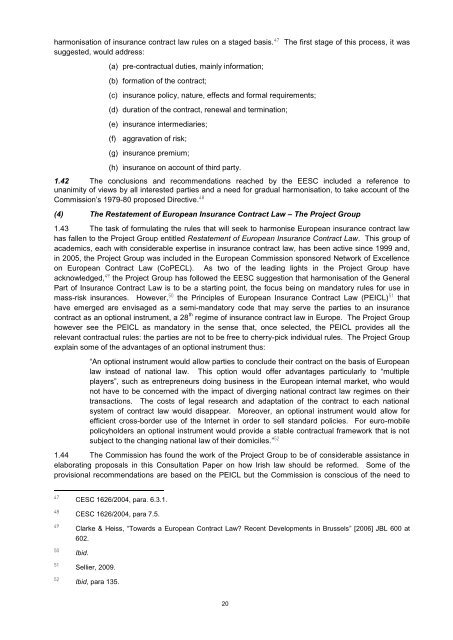Insurance Contracts CP - Law Reform Commission
Insurance Contracts CP - Law Reform Commission
Insurance Contracts CP - Law Reform Commission
Create successful ePaper yourself
Turn your PDF publications into a flip-book with our unique Google optimized e-Paper software.
harmonisation of insurance contract law rules on a staged basis. 47 The first stage of this process, it was<br />
suggested, would address:<br />
(a) pre-contractual duties, mainly information;<br />
(b) formation of the contract;<br />
(c) insurance policy, nature, effects and formal requirements;<br />
(d) duration of the contract, renewal and termination;<br />
(e) insurance intermediaries;<br />
(f) aggravation of risk;<br />
(g) insurance premium;<br />
(h) insurance on account of third party.<br />
1.42 The conclusions and recommendations reached by the EESC included a reference to<br />
unanimity of views by all interested parties and a need for gradual harmonisation, to take account of the<br />
<strong>Commission</strong>‘s 1979-80 proposed Directive. 48<br />
(4) The Restatement of European <strong>Insurance</strong> Contract <strong>Law</strong> – The Project Group<br />
1.43 The task of formulating the rules that will seek to harmonise European insurance contract law<br />
has fallen to the Project Group entitled Restatement of European <strong>Insurance</strong> Contract <strong>Law</strong>. This group of<br />
academics, each with considerable expertise in insurance contract law, has been active since 1999 and,<br />
in 2005, the Project Group was included in the European <strong>Commission</strong> sponsored Network of Excellence<br />
on European Contract <strong>Law</strong> (CoPECL). As two of the leading lights in the Project Group have<br />
acknowledged, 49 the Project Group has followed the EESC suggestion that harmonisation of the General<br />
Part of <strong>Insurance</strong> Contract <strong>Law</strong> is to be a starting point, the focus being on mandatory rules for use in<br />
mass-risk insurances. However, 50 the Principles of European <strong>Insurance</strong> Contract <strong>Law</strong> (PEICL) 51 that<br />
have emerged are envisaged as a semi-mandatory code that may serve the parties to an insurance<br />
contract as an optional instrument, a 28 th regime of insurance contract law in Europe. The Project Group<br />
however see the PEICL as mandatory in the sense that, once selected, the PEICL provides all the<br />
relevant contractual rules: the parties are not to be free to cherry-pick individual rules. The Project Group<br />
explain some of the advantages of an optional instrument thus:<br />
―An optional instrument would allow parties to conclude their contract on the basis of European<br />
law instead of national law. This option would offer advantages particularly to ―multiple<br />
players‖, such as entrepreneurs doing business in the European internal market, who would<br />
not have to be concerned with the impact of diverging national contract law regimes on their<br />
transactions. The costs of legal research and adaptation of the contract to each national<br />
system of contract law would disappear. Moreover, an optional instrument would allow for<br />
efficient cross-border use of the Internet in order to sell standard policies. For euro-mobile<br />
policyholders an optional instrument would provide a stable contractual framework that is not<br />
subject to the changing national law of their domiciles.‖ 52<br />
1.44 The <strong>Commission</strong> has found the work of the Project Group to be of considerable assistance in<br />
elaborating proposals in this Consultation Paper on how Irish law should be reformed. Some of the<br />
provisional recommendations are based on the PEICL but the <strong>Commission</strong> is conscious of the need to<br />
47<br />
48<br />
49<br />
50<br />
51<br />
52<br />
CESC 1626/2004, para. 6.3.1.<br />
CESC 1626/2004, para 7.5.<br />
Clarke & Heiss, ―Towards a European Contract <strong>Law</strong>? Recent Developments in Brussels‖ [2006] JBL 600 at<br />
602.<br />
Ibid.<br />
Sellier, 2009.<br />
Ibid, para 135.<br />
20

















